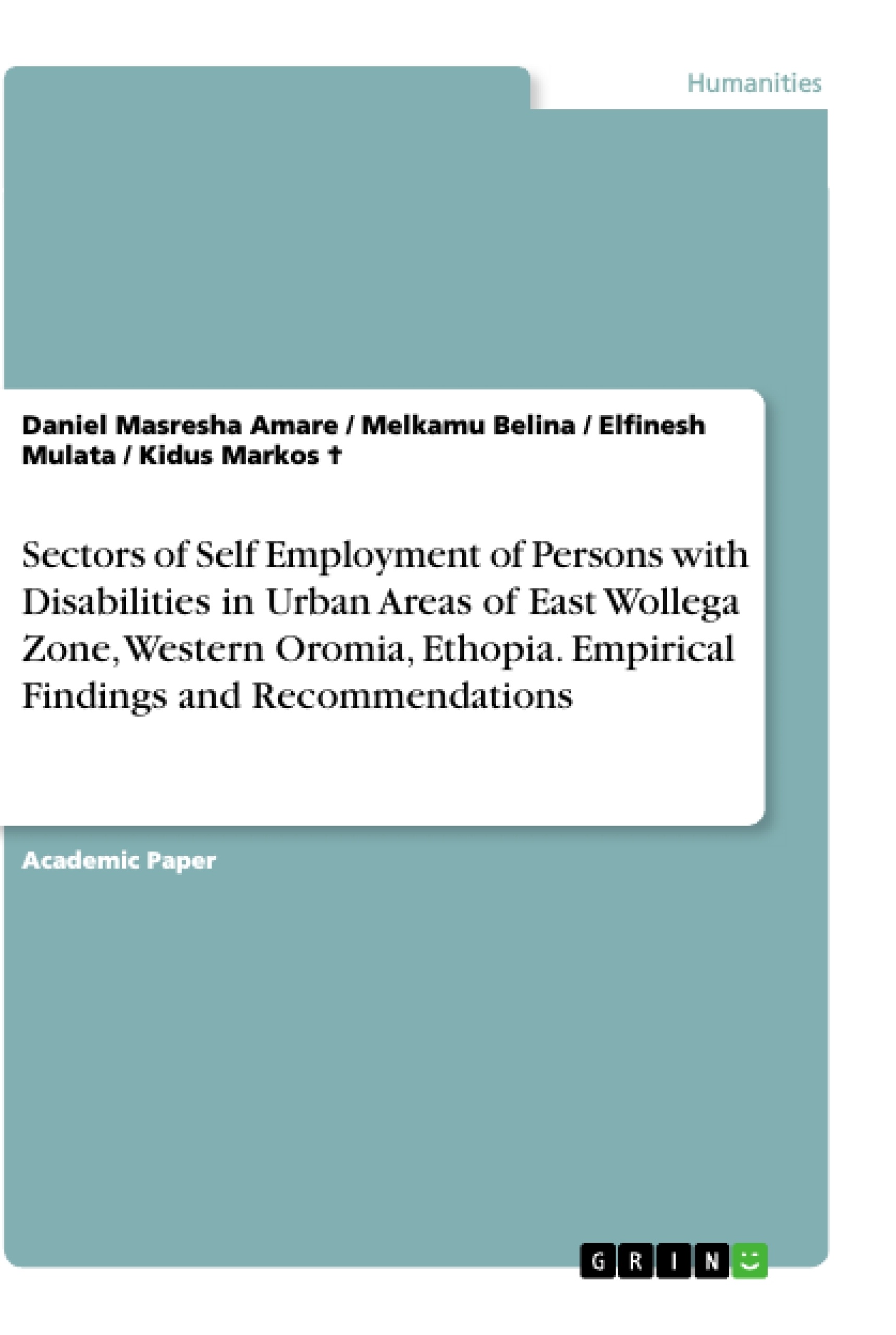This research study assesses the factors that affect the self-employment of the persons with disabilities in Urban Areas of East Wollega Zone and analses gender disparities on participation of the households in income generating activities and household income.
A simple random sampling of the persons with disabilities is therefore made from all the six sub cities, under Nekemte town, proportional to their size in each sub city. A total of 121 persons with disabilities are drawn and analysed using both descriptive and econometric analysis. The study reveals that 25.62 percent of persons with disabilities are engaged in income generating activities equally with other healthy (active) citizens of the people in the area. The use of credit, the social capital and better health condition are variables identified in significantly influencing their participation in income generating activities. The proportion of participation of female persons with disabilities is higher as compared to male counterpart. There is discrepancy in annual income of female heads compared to male headed. At the same time the study indicates that a significant number, 30.58 percent, still require a continuous support (health, food, sheltering, clothing, and so on) from any source to cope up with the highly competitive living condition.
The study recommends support on enhancing their educational level through training, health condition and provision of credit to increase their engagement in income generating activities for the healthy (able to work) persons; and provision of a continuous assistance for the remaining households that are in bad health condition.
Inhaltsverzeichnis (Table of Contents)
- Introduction
- Background of the Study
- Statement of the Problem
- Objectives of the Study
- Research Questions
- Significance of the Study
- Scope and limitation of the Study
- Literature Review
- Methodology
- Study area
- Sampling technique and sample size determination
- Data types, sources and methods of collection
- Data analysis
- Descriptive analysis
- Old age persons
- Disabled persons
- Econometric analysis
- Determinants of self employment of old age persons in IGAs
- Determinants of self employment of disabled persons in IGAS
- Gender Disparity
- Gender Disparity among urban old age individuals
- Gender disparity among the disabled persons
- Results and discussion
- Descriptive analysis
- Old age persons
- Disabled persons
- Econometric analysis
- Determinants of self employment of old age persons in IGAs
- Determinants of self employment of disabled persons in IGAS
- Gender Disparity
- Gender Disparity among urban old age individuals
- Gender disparity among the disabled persons
- Conclusion and Recommendations
- Elderly households
- Disabled households
- References
Zielsetzung und Themenschwerpunkte (Objectives and Key Themes)
The study aims to explore the factors affecting the self-employment of elderly and disabled persons in urban areas of East Wollega Zone, Oromia Region, Ethiopia. This research investigates the prevalence and challenges faced by these groups in pursuing self-employment within the context of their specific needs and circumstances.
- Determinants of self-employment among the elderly and disabled
- Role of socio-economic factors in influencing self-employment opportunities
- Gender disparities and their impact on self-employment participation
- Challenges and opportunities for self-employment initiatives
- Policy recommendations for supporting self-employment of the elderly and disabled
Zusammenfassung der Kapitel (Chapter Summaries)
- Introduction: This chapter establishes the context and rationale for the study, focusing on the background of self-employment among elderly and disabled persons in Ethiopia. It outlines the research problem, objectives, questions, and significance, emphasizing the importance of understanding this issue for socio-economic development.
- Literature Review: This chapter provides a comprehensive overview of existing literature relevant to the study's theme. It explores previous studies, theories, and frameworks related to self-employment, aging, disability, and their intersection within the Ethiopian context.
- Methodology: This chapter details the research methods employed in the study, including the study area, sampling technique, sample size determination, data types, sources, and analysis methods. It provides a transparent explanation of the data collection and analysis procedures.
- Results and Discussion: This chapter presents and analyzes the findings of the study, focusing on the descriptive and econometric analysis of the determinants of self-employment among elderly and disabled persons. It explores the prevalence, challenges, and opportunities associated with their participation in self-employment activities, highlighting key findings and patterns observed in the data.
Schlüsselwörter (Keywords)
This research focuses on the self-employment of elderly and disabled persons in urban areas of Ethiopia. Key themes include socio-economic factors, gender disparities, policy recommendations, determinants of self-employment, and challenges and opportunities for self-employment initiatives within the context of aging and disability.
Frequently Asked Questions
What factors influence self-employment for persons with disabilities in Ethiopia?
Key factors include access to credit, social capital, health condition, and educational level. These variables significantly impact the ability of disabled persons to engage in income-generating activities.
Is there a gender disparity in self-employment among the disabled?
The study shows that while female participation in income-generating activities is higher, there is a significant discrepancy in annual income, with female-headed households often earning less than their male counterparts.
What percentage of disabled persons in the study area are self-employed?
Approximately 25.62% of persons with disabilities in the East Wollega Zone are engaged in income-generating activities on par with other active citizens.
What are the main recommendations for improving their situation?
Recommendations include providing targeted training to enhance educational levels, improving health services, and ensuring better access to credit for those able to work.
How many disabled individuals still require continuous assistance?
About 30.58% of the participants still need continuous support for basic needs like food, health, shelter, and clothing due to poor health conditions.
- Quote paper
- Daniel Masresha Amare (Author), Melkamu Belina (Author), Elfinesh Mulata (Author), Kidus Markos † (Author), 2019, Sectors of Self Employment of Persons with Disabilities in Urban Areas of East Wollega Zone, Western Oromia, Ethopia. Empirical Findings and Recommendations, Munich, GRIN Verlag, https://www.grin.com/document/923699



